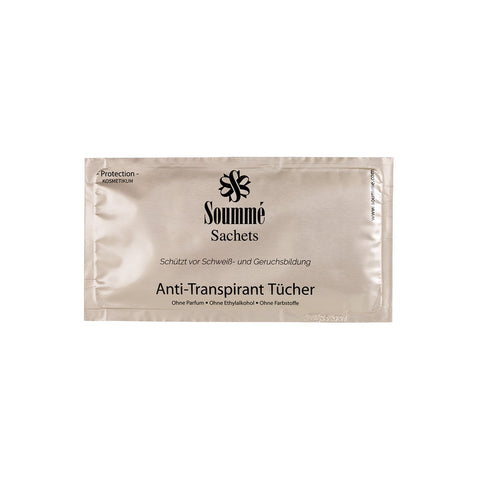Sweating - How it happens and how to stop it

Sweats come suddenly, but not without reason. While most people find it uncomfortable to sweat to a normal extent, we would prefer to sink into the ground if we broke out in a public sweat.
A situation that everyone has experienced before. Even at night, everyone has woken up bathed in sweat. But why is this and what can you do about it? Soummé clarifies!
Table of contents
What are the causes of sweating?
We can all get sudden sweats. They don't necessarily have to have a serious background. The sweating is often related to an emotionally tense situation .
Excitement is the classic – before an exam, a job interview, before the wedding. All special, not everyday moments that are characterized by routine. And all moments in which no one wants to sweat.
But other emotional situations can also cause sweating. For example, when we get scared, afraid of something or are surprised.
These are all stressful situations that get your circulation going and your body pumping. The body temperature rises. The sweat glands increase sweat production so that the body temperature can be maintained at a healthy level despite the challenging situation.
The same thing happens when we are exposed to high temperature fluctuations. Anyone who sits in the sauna consciously causes themselves to break out in a sweat.
But even when we walk outside from the air-conditioned department store on hot summer days, the body often reacts to the sudden temperature difference by breaking out in a sweat.
Sweating during menopause - really due to illness?

Many women find themselves increasingly confronted with sudden sweating in the middle of their lives - even if they have never had any problems with it before. Recurring hot flashes, sweats and night sweats are typical menopausal symptoms .
Menopause marks the transition from the phase of life in which women can have children to the phase in which pregnancy is no longer possible.
Sweating during this time is a completely natural phenomenon and not an illness.
Menopause usually begins in the mid-40s and occurs before and after the last period.
Around a third of women have to struggle with the medically harmless but very unpleasant symptoms of menopause for five years or longer.
During menopause, women tend to sweat more. At the same time, they are in one of the most challenging phases of life. Career and family usually challenge them in several ways.
Extra sweating is a minor catastrophe, even if it poses no health risk.
What to do if you break out in a sweat?
Sweating during menopause often occurs not only under the armpits, but also on the face, neck and upper body.
Regions where sweating cannot be easily hidden .
But we also thought about this and found the ideal solution - the Soummé antiperspirant wipes!

These can be used on the face and neck without any concerns or danger . When packaged individually, they work as easily as a damp towel.
However, they are soaked in a skin-friendly liquid that reduces sweating. Unlike a deodorant, this does not contain any fragrances because the ingredients actually close the outside of the sweat glands.
And that's exactly what you want, because only an antiperspirant can suppress sweat . Your face, neck, décolleté, hands, etc. stay dry and you stay fresh!
For the armpit region, we also have the ideal solution with our roll-on to prevent wet armpits.
Our focus is primarily on effectiveness. That's why our antiperspirant products specifically combat annoying sweating and prevent it instead of covering up the smell.
Instead of fragrances, dyes or alcohols, we rely on nourishing substances such as sage, aloe vera and allantoin.
Sweating as a symptom of illness
If sweats occur unusually often and for no understandable reason - for example when you are lying relaxed on the couch - it may be a symptom of an illness.
The triggers are varied, which is why you should always consult a doctor who will carry out a detailed anamnesis and diagnosis. The reasons are often harmless, but sometimes frequent sweating is a sign of (chronic) illnesses.
Possible illness-related reasons for sweating:
- diabetes
- neurological problems
- mental and psychiatric illnesses
- Overactive thyroid (hyperthyroidism)
- Tumor diseases
- Overweight (obesity)
- Changes in hormonal balance
Sweating is sometimes a side effect of medication.
This can also be the case if the medication has been changed. Here too, the doctor or alternatively the pharmacist is the first point of contact.
Allergic reactions can also occur along with sweating.
If there is no other medical reason, the increased sweat production is in itself a disease. In this case, doctors speak of hyperhidrosis.
Hyperhidrosis can manifest itself not only through a permanently increased activity of the sweat glands, but also through sudden attacks of sweating. Hyperhidrosis has no specific trigger and can also be inherited.
Sweating cannot be prevented - the smell of sweat and sweat stains can
There are various treatment methods for hyperhidrosis and other medical reasons for sweating that can reduce sweat production to a normal level or at least slightly reduce it.
In many everyday situations, sudden outbreaks of sweat cannot be prevented, but they do not necessarily have to lead to drops of sweat and a film of moisture, sweat stains under the armpits, wet outer clothing, salt residue and the smell of sweat.
An antiperspirant prevents sweat from the glands from escaping onto the skin and therefore keeps you fresh even in the most stressful situations.



